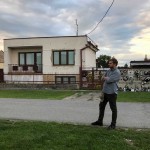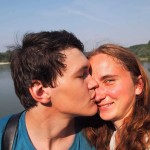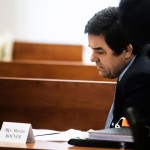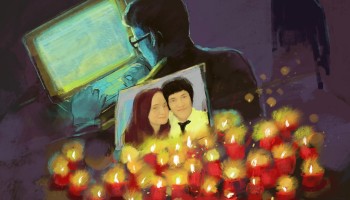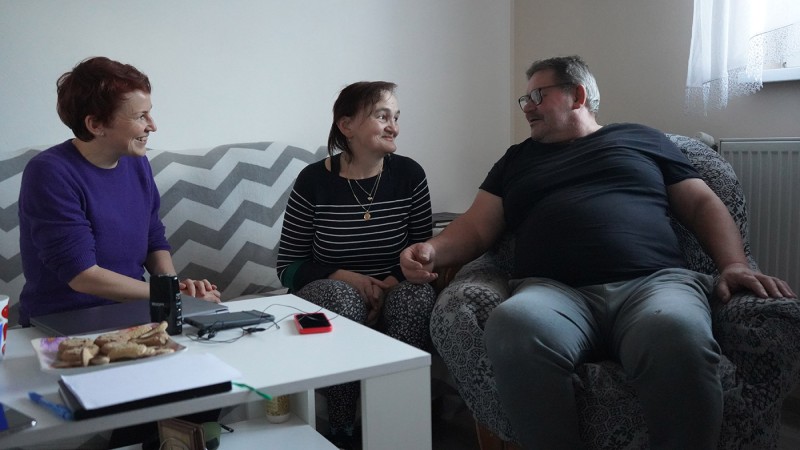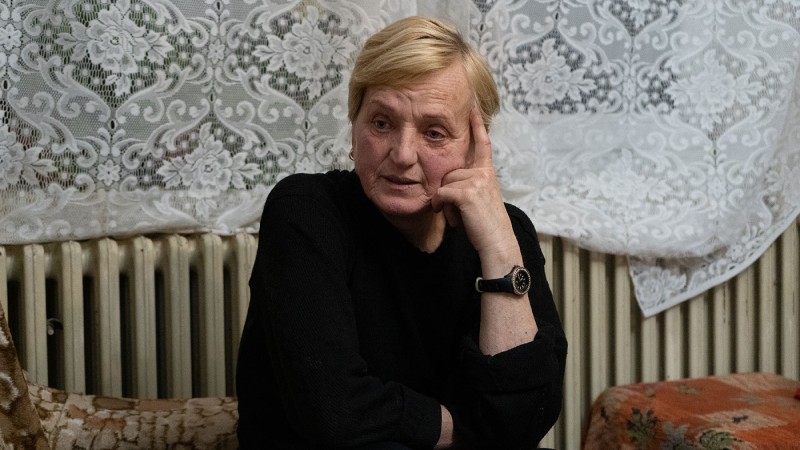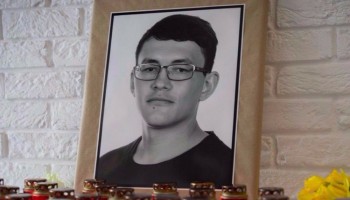Jana and Jozef Kuciak live in a remote village in northwestern Slovakia, near the Czech border. Both from farming families, they met many years ago at the local store where Jana worked. They still live in the house in which Jozef was born.
The couple’s lives were changed forever on February 21, 2018, when one of their children, investigative journalist Ján Kuciak, was murdered along with his fiancee Martina Kušnírová.
Kuciak had spent much of his career investigating Marian Kočner, a prominent businessman with deep ties in Slovakia’s police and judicial apparatus. Kočner was acquitted of ordering the young couple’s murder in September 2020, but after an appeal the country’s Supreme Court sent the case to a retrial, which is currently ongoing.
Meanwhile, five years after the death of their son, whom they affectionately call “Janko,” Jana and Jozef still visit his grave every day.
This interview has been edited for length and clarity.
So, you lived a completely normal life until February 21, 2018, when your world turned upside down?
Jana: We were not at all prepared for something like this. We lived a normal, humble life.
Jozef: For the first three days I didn't take in what was happening at all, even when we were dealing with the funeral. They were hurrying to finish Ján's wedding suit for us so that we could bury him in it.
Did you believe the murder would be investigated?
Jozef: When I first met the prosecutors and investigators about a month or two after the murder, they all seemed like such young and inexperienced guys. I thought they gave it to the young and inexperienced on purpose, to sweep it under the rug.
Then stories about the Italian mafia started coming out, and everything was heading in that direction. [But] I thought the mafia wouldn't act like that. Like, his car would explode [instead] or something.
Were you surprised that Marian Kočner was the main suspect?
Jozef: That didn't surprise me. I already thought of it when I was accepting the In- Memoriam award for Janko at the American embassy. I knew that Kočner had threatened him over the phone. So already then, I more or less suspected that he would be behind it.
Once there was media attention, did you get any supportive or threatening letters and messages?
Jozef: We're not on the social networks, so we have no way of encountering nice or bad comments. I received a letter that was delivered by two homeless people … I asked them who gave it to them, and they only said that someone had paid them 20 euros. I immediately tore up the paper. There were threats on it.
Were you in Velká Mača [the village where the couple were killed] after the murder?
Jozef: We were there a few times, but I never wanted to stay long.
Jana: I always wait for them to run out to meet me and ask if we want coffee.
Jozef: We were there for their personal things.
You and [Martina’s mother] Zlata agreed that the house would be demolished and a monument will be built in its place. How is this plan progressing?
Jozef: Originally, we only wanted to make a park there, nothing big. But the Trnava Region took it upon itself [to build a monument], that's why we postponed the demolition [of the house] so as not to tie the hands of the creative people.
It's meant to be a monument to freedom of speech. Their names may or may not be there. But there must be some greenery. It should be such a relaxing place. An international competition has been announced, applications are due by the end of April. I'm also on the jury.
What helps you cope with the situation?
Jozef: That we are together. We also meet with Zlata. The fact that we have our loved ones around us.
Jana: I think about [Ján and Martina] all the time. I don't think about anything else.
Jozef: We will always think of them. We go to the cemetery every day. It cannot be forgotten.
What role did Martina play in Ján's life?
Jozef: She was the first girl he introduced to us.
Jana: The first time they were supposed to come to visit us, Janko had to go and arrange something and dropped her off in the nearest town. He called me: “Mom, you have to pick her up from the bus.” I was shy in front of her; she was shy in front of me too. But then we started talking …
Jozef: I think it was the first serious relationship in his life. She had a more forceful nature compared to him. Whenever Janko went to Bratislava, he had to get up before six. And she always got up with him, made him breakfast and waited until he left. Then she went back to sleep.
The murder investigation revealed the dark side of Slovakia. How did you perceive the state of the country?
Jozef: In our country, these bad things are tolerated. It has always been said that whoever has money is right. He can pay his lawyers. I was never interested in politics, I was interested in whether I could take care of my family so that they didn't lack anything.
Those who steal and do tax fraud are from the old school, they learned under communism. No private property, everything belongs to everyone. And whoever grabs more has more.
How did you feel when they started arresting judges?
Jozef: After Kočner's Threema [encrypted messages] came to light and we saw what kind of relations he had with the Prosecutor General, I was not surprised. It [corruption] happens everywhere, even in district courts.
After the murder, there were some changes.
Jozef: Yes, but look how it looks now. People have short memories. How can SMER's [the political party in power at the time of the killings] ratings rise after everything that happened?
Personally, I didn’t expect any immediate changes. It can’t be done overnight. Especially when we look at relationships in the police or in the courts. It's all about the people, they have to think when they choose who will represent them.
Who is Kočner for you?
Jozef: Kočner is a big-mouthed con artist. His entire career was built on extortion. For that, he had [his alleged accomplice in the murders] Alena Zsuzsová and who knows how many others to find him information. And then he used it, he built a career on it … First get some dirt on everyone, play their friend, and then take advantage.
(Read OCCRP’s investigation about how Kočner gained his influence in Slovakia’s law enforcement and justice system)
If you met Kočner, what would you say to him, Jana?
Jana: I would tell him that he is... a villain!
Jozef: If I had met him right after the murder, I probably wouldn't have resisted [temptation] and [would have] started in on him. Now I'd probably ignore him. I have nothing to talk about with such a person.
Are you afraid people will forget the murder?
Jozef: I don't mind if they forget the murder. But they should not forget why it happened. Above all, they should not allow it to ever happen again.
How do you feel about the fact that memorials are being built to Ján and Martina?
Jozef: I have such a special relationship with monuments. There is a need for people to be reminded, but not with some flashy flagpoles. I wish there were words on that memorial that people would not forget, which Janko often used: “Don't thank; remember.”
Zlata Kušnírová: ‘I would do anything for justice’
We visited Zlata Kušnírová at her home in Gregorovce in eastern Slovakia. As her grandchildren and foster children milled about, she told us about her life, the death of her husband, how corruption prevented her daughter — whom she calls ‘Martinka’ — from becoming a police officer, and how she copes with her murder. As she said goodbye to us, she filled our hands with packages: "And here I have eggs prepared for you! Take that to Prague!"
How would you describe yourself?
I'm impulsive, I talk too much. Sometimes I should think more than I speak, but I would do anything for justice.
Did you grow up here?
Yes, in this house. When I was still small, one day my mother did not come home and I had to take care of the whole farm. Until I got married and had children, I worked as a designer. After my maternity leave with Martinka, I went to work at the post office, where I spent 17 years.
What did your husband do?
He started having problems with his health right after our wedding. He was very hard-working and tried to help as much as possible. [He died] 17 years ago on February 17. I took it very hard. Martinka helped me deal with it at the time. It was difficult to make ends meet, luckily I had support from my mother.
On February 21, 2018, how did you find out that something was happening?
On Sunday, Janka Kuciaková called me [to say] that something was wrong, because Ján and Martina] didn’t come to the church for the pre-marriage lesson. She had a feeling something had happened to them.
It occurred to me that they were in a car accident and had ended up in the hospital without documents. I thought they were alive, that they were just in the hospital. When we arrived at the NAKA [National Crime Agency] building [in Nitra] and I saw the Kuciaks with their heads in their hands and crying, I thought that Martinka and Janek were probably in a coma or something.
How did the police tell you what happened?
Pretty nasty. The police came out to meet us and asked me who I was. When I told them, one said: "So you are the lady from the east, the mother of the murdered girl?"
Did you believe in the beginning that the murder would be investigated?
I knew how it works in Slovakia, so I was prepared for the fact that it would never be resolved.
Has your life changed? There was a lot of media interest in you, and you even received an offer to enter politics, but there were also negative responses and comments. How did you cope?
It was very difficult at first. After what happened to Janko and Martina, there were attacks from bad people. They didn't know what I was going through. But I told myself that if I didn't go crazy and I wasn't killed by their murders, these people wouldn't destroy me mentally either. I braced myself. Anyone can say what they want to me, I knew Martinka and Janko well, I knew their opinions on current and former politicians. I stand by my opinions, period.
Now I am a member of the municipal council and I am in charge of the cultural committee. However, I turned down the offer [to enter] big politics. Even if it's a lot of money, it's not for me.
Someone even destroyed Martina's grave.
Every time I came to the grave, the vase was overturned and the flowers were scattered around. So I got angry and put up a big poster in the local shop, which said that if someone wants to say something to me, they should come to my house … But please leave Martinka's grave alone, she didn't do anything to them. Then it stopped.
What should the monument look like?
We don't know exactly yet, there was a public competition. I think the memorial should be about them [the couple] first and foremost.It's personal, they were supposed to get married, have a finished house, have children.
Journalism comes second. Let them write about freedom of speech there, but not as the main thing. It should be about the two of them in the first place, it should be their home, they were killed there, their blood was left there. Let it be about the two of them.
What helps you cope with their deaths?
As I say, friends. I keep talking about the same thing over and over, and they never tell me to shut up, that they've already heard it a hundred times. Otherwise, I would just have to deal with it myself.
What role did Martina play in Ján's life?
He was incredibly fond of her. If he had a choice back there, he would definitely have sacrificed himself to save her. If Janko didn't have Martina, maybe he wouldn't be where he was. Yes, he was smart, but if he didn't have her support, I don't know if he would have made it this far.
He reminded me of my husband. There is probably something to the idea that children choose their partners according to their parents. She had several suitors, but no one was ever good enough for her, she always had some reservations about them. Then Jano appeared and there was silence. Janko was so calm, happy. He was just golden.
The investigation of the murder also revealed the dark side of Slovakia - corruption in the court, the police, and prosecutors. Did you feel it? Have you personally encountered corruption, the fact that the system is not in order?
Yes. When Martinka applied to the police academy, they wanted five thousand euros from me.
To accept her?
Yes. I wanted to write to the leadership of the police. But Martinka told me that I had better keep quiet, that I would embarrass myself. It really annoyed me, because she would have been successful. She really wanted to get into that school.
To be honest, I didn't understand what they wanted the five thousand for, after all it's a public school. They claimed it was a sponsorship. I told her to write everything down, we'll go after them! But she didn't want to.
How do you perceive the changes in society after the murders? The political upheaval, the arrests of judges, policemen, how SMER lost the elections, and Zuzana Čaputová being president?
In the beginning there was such a big boom, protests, then elections. But now the opposition is winning (again) because the coalition is arguing, they are weak and the opposition is profiting from it.
Society is divided, the bad guys are now seen as the good guys. I can't say anything bad about the president, I think she's a great person, whether as a woman, a mother, or a politician.
The [initial] verdict [when Kočner was found innocent] was a horror. We cried. And in Donovaly, where Kočner had his luxurious cottages, they set off rockets and celebrated.
As parents, you sat in the front row when the Supreme Court decision to send the case to a retrial was read. What were your feelings?
The worst part was the waiting and the uncertainty of who the judge was, who the members of the Supreme Court panel were. After all, Kočner had a lot of friends, so it wasn't clear if they would side with him. But in the end, it turned out great, and a stone fell from one's heart. We are already looking forward to better times. I think it will have some effect, even though the situation in our judiciary is bad.
Will you also participate in the new hearings, which will begin in the coming months?
Yes, I'm going there. I think that just as it is unpleasant for us to see Kočner and [his alleged co-conspirator Alena] Zsuzsová, it is similarly unpleasant for them [to see us]. I can look them in the eye. I can stand it for Martinka and Janko, even if I have to sit there from morning to evening.
If you had the opportunity to meet Kočner in person, outside of court, what would you say to him?
Saying something to him is like throwing peas against a wall, it wouldn't touch him in any way. Waste of words. He doesn't show it on the outside, but inside he's definitely laughing at us that he has money and friends and that he can arrange everything.
Do you think that Kočner still has something up his sleeve?
He has money, and whoever has money has power. If our courts cut him off from the money, it would be worse for him, he would lose his friends. But as long as he has money … he will always have the option of doing something, somehow. But maybe justice will prevail.
I'm not a psychiatrist, but it seems to me that he is such a tough guy, a narcissist who will keep hoping until the last minute. I think he would rather die than give up. It would be good for us if he revealed who is still hiding behind all the Slovak evil. I may not live to see it, but I believe that justice will come one day.
Many people say that the [changes in the aftermath of the] deaths of Ján and Martina gave Slovak society hope. Is there still hope for a better, more decent and fairer Slovakia?
If you had asked me a year ago, when they started detaining judges and police officers, I would have said yes. Now I think it's about 50/50.
Do you think people are slowly forgetting about the murder?
Yes! Definitely yes. Everyone is solving their own problems. People have lost their jobs because of COVID, they have no money.
How do you remember Ján and Martina? Are you looking at photos?
Yes, I'm browsing. I also have some albums on my phone. I sit here in front of the TV and think about the good times we had together. Martinka was a very good child, although she was stubborn — she got that from me — and when two goats get together, it can't end in anything other than a fight. But we always made up in five minutes, we never got angry at each other.
And Janko, he was one big cutie. He kept [working] and finding out what was needed. When I go through the gate, I can still see how he was working, even on the day of his graduation. After the murder, I spoke about them both as my children … I accepted him as mine.

